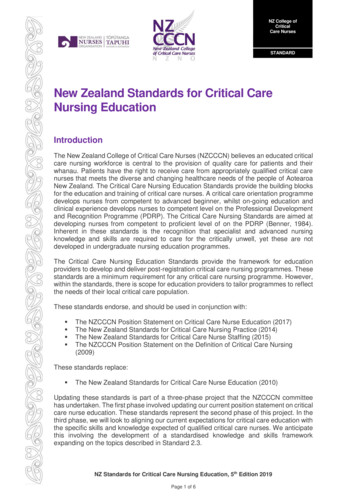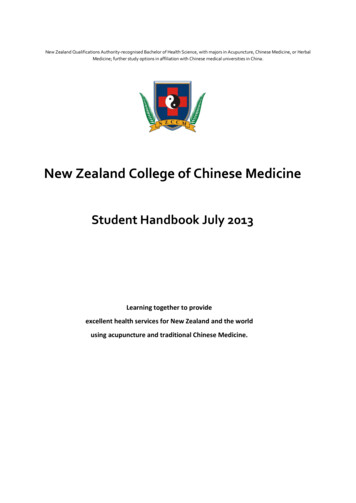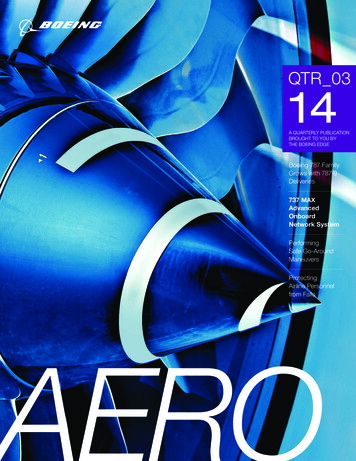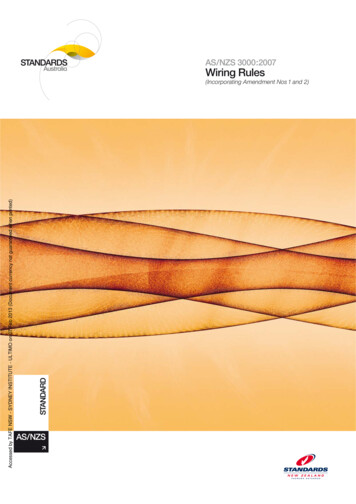
Transcription
NZ College ofCriticalCare NursesSTANDARDNew Zealand Standards for Critical CareNursing EducationIntroductionThe New Zealand College of Critical Care Nurses (NZCCCN) believes an educated criticalcare nursing workforce is central to the provision of quality care for patients and theirwhanau. Patients have the right to receive care from appropriately qualified critical carenurses that meets the diverse and changing healthcare needs of the people of AotearoaNew Zealand. The Critical Care Nursing Education Standards provide the building blocksfor the education and training of critical care nurses. A critical care orientation programmedevelops nurses from competent to advanced beginner, whilst on-going education andclinical experience develops nurses to competent level on the Professional Developmentand Recognition Programme (PDRP). The Critical Care Nursing Standards are aimed atdeveloping nurses from competent to proficient level of on the PDRP (Benner, 1984).Inherent in these standards is the recognition that specialist and advanced nursingknowledge and skills are required to care for the critically unwell, yet these are notdeveloped in undergraduate nursing education programmes.The Critical Care Nursing Education Standards provide the framework for educationproviders to develop and deliver post-registration critical care nursing programmes. Thesestandards are a minimum requirement for any critical care nursing programme. However,within the standards, there is scope for education providers to tailor programmes to reflectthe needs of their local critical care population.These standards endorse, and should be used in conjunction with: The NZCCCN Position Statement on Critical Care Nurse Education (2017)The New Zealand Standards for Critical Care Nursing Practice (2014)The New Zealand Standards for Critical Care Nurse Staffing (2015)The NZCCCN Position Statement on the Definition of Critical Care Nursing(2009)These standards replace: The New Zealand Standards for Critical Care Nurse Education (2010)Updating these standards is part of a three-phase project that the NZCCCN committeehas undertaken. The first phase involved updating our current position statement on criticalcare nurse education. These standards represent the second phase of this project. In thethird phase, we will look to aligning our current expectations for critical care education withthe specific skills and knowledge expected of qualified critical care nurses. We anticipatethis involving the development of a standardised knowledge and skills frameworkexpanding on the topics described in Standard 2.3.NZ Standards for Critical Care Nursing Education, 5th Edition 2019Page 1 of 6
As a college, we are passionate about providing quality critical care to the people ofAotearoa New Zealand. Integral in this endeavour is the provision of quality postregistration critical care nurse education programmes, which embody the principles ofcultural safety and Te Tiriti O Waitangi. It is hoped that the NZCCCN Critical Care NursingEducation Standards will facilitate the ongoing development of excellence in critical carenursing here in Aotearoa New Zealand.The NZCCCNAugust 2017We acknowledge the use of The Critical Care Networks National Nurse Leads National Standardsfor Adult Critical Care Nurse Education (2016) from the United Kingdom in this update of theNZCCCN Standards for Critical Care Nursing Education.Standards1. The Education ProgrammeSTANDARD ONEThe educational programme must equip critical care nurses with theknowledge and skills to safely and effectively care for critically ill patients inAotearoa New Zealand.This standard is being met when:1.1Post registration critical care courses are accessible to registered nursesworking in the critical care environment1.2The education programme adheres to the standards outlined in this document1.3The education programme adapts and remains responsive to the evolvingnature of healthcare1.4The education programme is underpinned by the principles in Te Tiriti OWaitangi, and recognises and responds to Māori health needsSTANDARD TWO2. The CurriculumThe curriculum is developed collaboratively and directed towards providingthe theoretical, clinical, and professional preparation necessary to develophigh calibre critical care nurses.This standard is being met when the curriculum:2.1Is developed by a or in consultation with a level 3 critical care unit2.2Includes defined aims, objectives, and teaching methods, and contentassessment criteria for the programme2.3Includes, but is not limited to the following: Knowledge of relevant anatomy, physiology and pathophysiology The ability to manage the critically ill patient along a variety of patientpathwaysNZ Standards for Critical Care Nursing Education, 5th Edition 2019Page 2 of 6
Competence to assess, plan, implement and evaluate care for criticallyunwell patientsPsychosocial care of the patient and their familyKnowledge relating to pharmacology and pharmacokineticsKnowledge of treatment modalities, investigations, interpretation, andapplication of resultsSafe and effective use of critical care equipmentThe ability to demonstrate leadership, management and team skillsThe ability to plan and contribute to rehabilitation alongside the widerMDT2.4Provides both theoretical and practical content to provide the nurse withknowledge to assess, plan, manage, document, and critically analyse the careof the critically ill patient and their family2.5Practical content is designed to complement and reinforce the programme’stheoretical knowledge component2.6Enables the participant to demonstrate knowledge in relation to Te Tiriti OWaitangi, and the impact of services on the delivery of nursing care for Māoriand Māori health2.7Is based on current best evidence and practice guidelines2.8Is reviewed annually to ensure congruity with the programme content, andongoing responsiveness to changes in healthcare3. Student ResponsibilitiesStudent responsibilities in critical care nursing education programmes areexplicit, fair and equitable.STANDARD THREEThis standard is being met when the student:3.1Has current registration with the Nursing Council of New Zealand3.2Is a Registered Nurse working in an area providing critical care3.3Has completed a unit specific critical care orientation programme3.4Is deemed to have adequate prior knowledge and experience and thereforereceives the support of their manager3.5Completes a minimum of 600 hours working in the critical care area for theduration of the programme to ensure the integration of theoretical andclinical learning3.6Ensures they comply with the education provider attendance requirementsNZ Standards for Critical Care Nursing Education, 5th Edition 2019Page 3 of 6
4. Education Provider ResponsibilitiesEducation providers must ensure the quality and credibility of the critical careeducation they provide.STANDARD FOURThis standard is being met when education providers:4.1Ensure programme co-ordinators are qualified critical care nurses with provenskill in teaching nursing education4.2Ensure programme co-ordinators are proficient in theory, research andevidence based practice4.3Ensure programme co-ordinators are clinically credible with relevant practicalexpertise4.4Support clinical placement to facilitate learner development and achievementof learning outcomes4.5Support preceptors and/or assessors to facilitate learner development andachievement of learning outcomes4.6Ensure preceptors and/or assessors are appropriately qualified critical carenurses4.7Establish strategies to reduce the financial burden faced by nursesundertaking critical care education4.8Ensure adequate access to resources including: Formal learning time Educators with current specialist knowledge in critical care Library services4.9Ensure education programmes are provided in partnership with health careinstitutions to enable the integration of theoretical and clinical learning asdescribed in Standard 3.5STANDARD FIVE5. Assessment ProcessesParticipants will be assessed throughout and on completion of the programmeto ensure learning outcomes have been achieved.This standard is being met when:5.1The programme assesses both theoretical knowledge and practicalcompetence5.2Practical competencies are developed by critical care qualified nurses(A framework to be developed in phase three will provide guidance on thespecific skills and knowledge expected of qualified critical care nurses)NZ Standards for Critical Care Nursing Education, 5th Edition 2019Page 4 of 6
5.3Course participants are evaluated by clinical assessors who possess a postregistration critical care qualification and/or have appropriate experience5.4Clinical assessors are responsible for ensuring practical assessment criteria aremet5.5Assessment criteria may include: Exams Exemplars Case Studies Assignments Presentations Research Oral Structured Clinical Exams (OSCE) Clinical Audit5.6The programme includes robust strategies that address issues related tofailure and the appeals process5.7At the end of the programme, the student receives documented evidence ofsuccessful completion of the critical care nursing qualification6. Quality MonitoringSTANDARD SIXCritical care nursing education courses will be subject to quality monitoringand assurance practices.This standard is being met when:6.1Education providers review and evaluate course outcomes annually6.2Education providers hold local stakeholder meetings to evaluate coursecontent and to explore and support ongoing workforce development6.3Education providers are expected to assess the suitability of the learningenvironment and ensure appropriate clinical placement of students in order tomeet Standard 2.36.4Feedback is sought from students following completion of their study and isused in the annual course evaluationNZ Standards for Critical Care Nursing Education, 5th Edition 2019Page 5 of 6
References and related documentsCritical Care Networks National Nurse Leads (2016). National standards for adult criticalcare nurse education. Retrieved from http://www.cc3n.org.uk/Critical Care Nurses Section (2009). Position statement on the definition of critical carenursing. Wellington: New Zealand Nurses Organisation.Critical Care Nurses Section (2010). New Zealand standards for critical care nursingeducation (4th ed.). Wellington: New Zealand Nurses Organisation.Critical Care Nurses Section (2014). New Zealand standards for critical care nursingpractice. Wellington: New Zealand Nurses Organisation.New Zealand College of Critical Care Nurses (2015). New Zealand standards for criticalcare nurse staffing. Wellington. New Zealand Nurses Organisation.New Zealand College of Critical Care Nurses (2017). Position statement on critical carenurse education. Wellington. New Zealand Nurses Organisation.Date adopted: 2010Review date: 2024Principal author: Critical Care Nurses sectionReviewed: 2019Correspondence to: nurses@nzno.org.nzMission statementNZNO is committed to the representation of members and the promotion of nursing and midwifery. NZNOembraces Te Tiriti o Waitangi and works to improve the health status of all peoples of Aotearoa/ NewZealand through participation in health and social policy development.This material is copyright to the New Zealand Nurses Organisation.Apart from any fair dealing for the purpose of private study, research, criticism or review, as permitted under the CopyrightAct, no part of this publication may be reproduced by any process, stored in a retrieval system or transmitted in any formwithout the written permission of the Chief Executive of the New Zealand Nurses Organisation (NZNO), PO Box 2128,Wellington 6140.NZ Standards for Critical Care Nursing Education, 5th Edition 2019Page 6 of 6
The Critical Care Nursing Education Standards provide the building blocks for the education and training of critical care nurses. A critical care orientation programme . pathways . NZ Standards for Critical Care Nursing Education, 5th Edition 2019 Page 3 of 6 Competence to assess, plan, implement and evaluate care for critically










